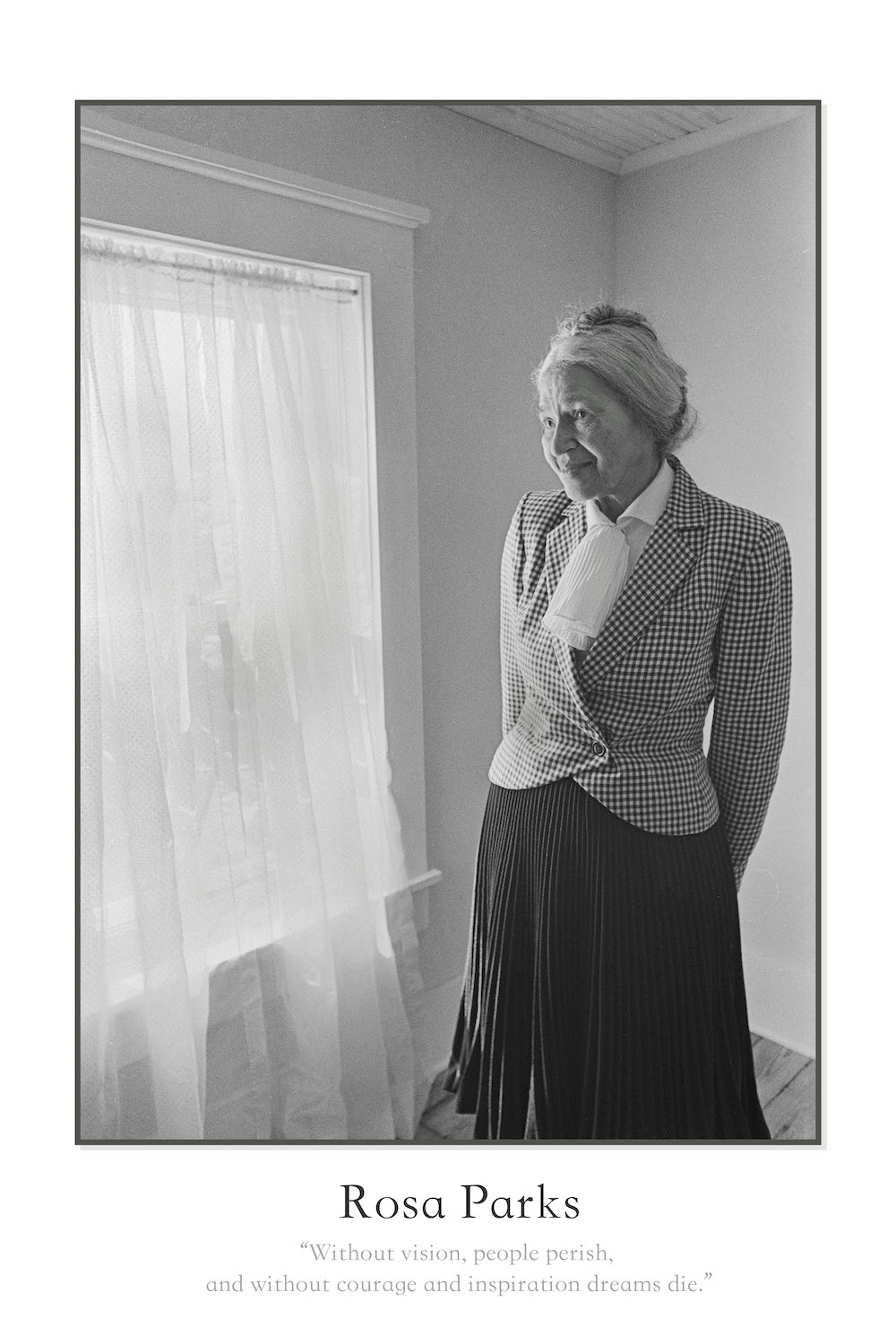Rosa Parks: Sentinel for Equality

Christine Garceau
Powell, Wyoming and Marquette, Michigan
Rosa Parks: Sentinel for Equality
1989 Photograph
Often, when we think of Rosa Parks in historical context, we think of her refusing to yield her bus seat on December 1, 1955 in Montgomery, Alabama. However, focusing on Parks in the context of this single-storied narrative overlooks a life dedicated to social justice and the advancement of human rights and equality for people of color.
The snapshot-like view of Park’s arrest to challenge discriminatory
treatment often neglects to illuminate her extensive anti-racism training as well as the careful organizational planning that preceded this action. Her arrest intentionally launched the bus boycott that forced desegregation on Montgomery buses. Parks rose into a position of leadership in the civil rights movement in Alabama and beyond. Also missing from the popular but incomplete narrative is her activism in Detroit, Michigan, where she worked tirelessly for the cause of
equality.
In this photo we see Parks at age 78, standing before us as a sentinel for her time. We can recognize her as someone standing guard, someone whose courage is inspirational in the face of escalating white nationalism, and strong resistance led by the Black Lives Matter movement. I took this photograph a few hours after Parks had delivered the commencement speech for the graduating class at
Michigan Technological University in May of 1989. Her return flight from the Upper Peninsula of Michigan to Detroit was delayed due to fog, and
thus I came to be in her presence with camera in hand.
Emerging from the silver halides of the frame, Parks stands next to a window in an old farmhouse on Quincy Hill in the Keweenaw Peninsula. She emanates calm, perhaps reflective of the message she had given to graduates entering a complicated world. Light coming through the window metaphorically frames a portal, a guide to the future as expressed in these words she had just spoken:
“And as we move into the nineties away from 1989, it is up to us to first rid our own minds and hearts from prejudice toward other people because of race, creed, color or religion – [and] to look at every human being as a person of worth, regardless of how they may appear to you. And we should think in terms of what can be and should be and will be developed into a world of peace, prosperity, and success.”
Bio
At Northwest College in Powell, Wyoming Christine Garceau enjoys mentoring photography students to realize their dreams of becoming professional photographers. She currently teaches classes in photojournalism, video storytelling, digital imaging, the history of photography, large format photography, portfolio production and commercial portraiture. Travel has always been a part of Garceau’s photographic exploration, including leading and participating in field studies trips with students to Romania, Cuba, Argentina, Uruguay, Portugal, Costa Rica, England, and Columbia. Her current photographic research springs from a personal passion to understand how place contributes to the construction of one’s cultural, political, and economic identity. Moving from the tall pines along the south shore of Lake Superior to the moisture-depleted high desert of northwest Wyoming has inspired a new body of photographic research, one focused on natural habitats and their continued preservation for wildlife and humans.
Before moving to Wyoming from Michigan in 2012, Garceau taught at Northern Michigan University in Marquette and Michigan Technological University in Houghton. Her classroom pedagogy is underpinned simultaneously by her years of teaching in the academy and twenty years of operating Christine Garceau Photography, LLC with her late husband Phillip Garceau, along with many years as a free-lance photojournalist. Garceau’s photographs have appeared in the Marquette Mining Journal, Detroit Free Press, Detroit News, National Geo World, USA Today and numerous other national print and digital media publications.
Garceau earned a Bachelor of Science (BS) in Photography with a minor in music, a Master of Arts in Education (MAE) in Photography from Northern Michigan University, and a Doctor of Philosophy (PhD) in Rhetoric and Technical Communication. Her dissertation research was based critiquing the theory of visual representation relating to the cultural formation of identity due to race, class, gender, and age.

